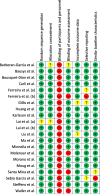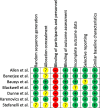Effect of prehabilitation programmes on functional capacity in patients awaiting oncological resections: a systematic review and meta-analysis of randomised controlled trials
- PMID: 39287834
- PMCID: PMC11408567
- DOI: 10.1007/s00520-024-08875-8
Effect of prehabilitation programmes on functional capacity in patients awaiting oncological resections: a systematic review and meta-analysis of randomised controlled trials
Abstract
Purpose: To investigate the effects of prehabilitation on the perioperative functional capacity of patients awaiting oncological resections.
Methods: A systematic review and meta-analysis were performed in accordance with the Preferred Reporting Items for Systematic Reviews and Meta-Analysis (PRISMA) checklist and within the databases Cochrane Library, EBSCOhost, Google Scholar, MEDLINE PubMed, and Web of Science. The eligibility criteria were set to include peer-reviewed randomised control trials including only adult (≥ 18 years old) patients undergoing any type of prehabilitation (PREHAB) prior to any type of oncological resection. The studies had to feature at least one control group undergoing standard care (SC) and had to assess functional capacity by means of a 6-min walk distance (6MWD) or peak oxygen uptake (VO2Peak) at different stages pre- and post- operatively.
Results: Twenty-seven randomised controlled trials involving 1994 patients were included. After processing the data, the number of patients was 1889. Studies featured different cancer specialties: lung (11), colorectal (5), urological (4), abdominal (3), esophagogastric (2), liver (1), and gastrointestinal (1). Overall, PREHAB enhanced both 6MWD (g = 0.273, 95% CI 0.174 to 0.371, Z = 5.406, p < 0.001) and VO2Peak (g = 0.615, 95% CI 0.243 to 0.987, Z = 3.240, p = 0.001) compared with SC. The 6MWD subgroup analysis revealed a small mean effect size favouring both unimodal and multimodal PREHAB interventions.
Conclusion: These findings support that prehabilitation, whether implemented as unimodal or multimodal format, elicits small preoperative improvements in functional capacity in patients awaiting oncological resections. PROSPERO registration number CRD42023428676.
Keywords: Cancer; Exercise; Surgery.
© 2024. The Author(s).
Conflict of interest statement
The authors declare no competing interests.
Figures





References
-
- Milder DA, Pillinger NL, Kam PCA (2018) The role of prehabilitation in frail surgical patients: a systematic review. Acta Anaesthesiol Scand 62:1356–1366 - PubMed
-
- MacMillan (2019) Principles and guidance for prehabilitation within the management and support of people with cancer. MacMillan Cancer Support; 2019
-
- van Stefanus JR, Molenaar CJLMD, Schep GMD et al (2019) Making patients fit for surgery: introducing a four pillar multimodal prehabilitation program in colorectal cancer. Am J Phys Med Rehabil 98:888–96. Available from: https://search.ebscohost.com/login.aspx?direct=true&AuthType=sso&db=aph&... - PubMed
-
- Stefanelli F, Meoli I, Cobuccio R, Curcio C, Amore D, Casazza D et al (2013) High-intensity training and cardiopulmonary exercise testing in patients with chronic obstructive pulmonary disease and non-small-cell lung cancer undergoing lobectomy. Eur J Cardiothorac Surg 44:e260–e265 - PubMed
Publication types
MeSH terms
LinkOut - more resources
Full Text Sources
Medical

